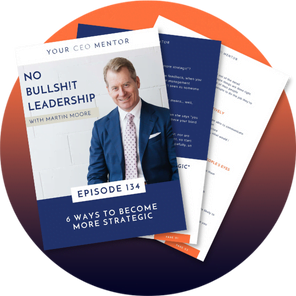With Martin G. Moore

Have you ever been told that you need to be “more strategic”?
It can come as part of the dreaded post-interview feedback, when you find out that you haven’t got the job, or in a talent management discussion when your boss tells you that you aren’t seen as someone who might rise to the next level.
Telling someone that they need to be more strategic means… well, nothing!
This episode explores what your boss really means when she says “you need to be more strategic”, and I give my 6 top tips for becoming more strategic (with some work and commitment, over time).
DOWNLOAD YOUR FREE COPY OF:
THE 6 WAYS TO BECOME MORE STRATEGIC

Get yours delivered straight to your inbox by filling out the form below 👇
Transcript
I often hear about the aftermath of conversations that people have had with their bosses around career development and promotion. And this comes in many forms. The dreaded post-interview feedback, when you haven’t got the job. The talent management discussion, when you find out that you aren’t seen by your organisation, as someone who might rise to the next level. And of course, the annual performance review, where anything useful you get is a bonus. One of the most common pieces of feedback that people relate to me is the statement their boss makes, “You need to be more strategic”, which sort of means… nothing.
Wait, What does it really mean to be strategic?
If you haven’t done so already go back and listen to Episode #85: Strategy Isn’t Hard. This should give you all the background and context you need to start to think about what strategy is really about in practise. In order to understand this, I’ve had a good think about the expression as it tends to be used in two different contexts.
First, on the positive side, when a leader says that one of their people is very strategic, and you hear this quite often. And second, on the negative side, when a leader tells someone that they need to be more strategic. Now on the positive end, over the years I’ve heard senior leaders refer to people who work for them as being “very strategic”, and sometimes I see what they’re getting at! Other times though, I’m left scratching my head.
Let’s look at some common themes. I’ve got three clear examples:
When there’s an element of consensus in thinking between a leader and one of their proteges
Now you can read into this many ways, but for me, often the person being mentioned has no strategic attributes other than being at pains to agree with their boss. This is a simple case of what we call affinity bias. For example, a leader may attribute one of their people with the halo of being a strategic thinker purely because they demonstrate a similar worldview. Now sometimes a leader who is anything but strategic, may subjectively label a direct report with a similar thinking style as being strategic, because that halo swings both ways.
In the end, you have a person with little strategic thinking capability who has a lot of people around them who also have no strategic thinking capability. Despite this, they consider themselves to be strategic. This is a classic case of believing your own bullshit.
When someone is labelled as being very strategic, when really what they are is just an innovative thinker
Now I think there’s a really big difference between being an innovative thinker and being a strategic thinker, but these two things are often confused. It takes me back to a Director on a board I reported to once, who was a very innovative thinker. She often came up with ideas that were out of the box and no one else had thought about, and some of these could have even been useful. But by and large, there was no connection between a random thought bubble and the things that would actually be of strategic benefit. Like how would this idea mesh with our current portfolio of products, services, and capabilities? Where would a market opportunity lie and how substantial was it likely to be? What would the competitive landscape look like now and into the future? How would we develop the idea to test its merits? So for the most part, these innovative ideas were relegated to the scrap heap of impractical and unattractive options that couldn’t be pursued, and there was nothing that looked strategic in that universe.
When good presenters get a reputation for being strategic
Now I think there’s actually something in this. If you can distil complex information into a form that’s easy to explain and understand, I would consider that to be a strategic skill. Often, this is accompanied by flashy PowerPoint charts and sexy presentations. You can see the difference in thinking, in terms of how some people present. A strategic thinker will use a few well-targeted charts, graphs, or images to get their point across, with minimal use of text. It supports their verbal presentation rather than the words they say, being a slave to the slides. But for a leader who’s been labelled as not strategic, their slides are usually dense with information, highly complex, and at points almost unintelligible. People who can’t get out of the detail, find comfort in the volume of information they present. Where strategic thinkers stay at 30,000 feet and just describe what’s going on in the context of the overall playing field.
So let’s swing around to the other side of the equation and talk about the negative side. The indicators that some bosses pick up as a sign that you may not be strategic.
When leaders can’t present well
Many people who can’t present well, often don’t have the ability to explain anything without going into an excruciating level of detail. Their words are all in the language that the audience understands, but they just don’t seem to make any sense. It feels like you’re hearing a series of disconnected thoughts that don’t align or have any logical flow. Becoming buried in too much detail sometimes means that you can’t see the forest for the trees. A good presenter, with strategic thinking ability, can tell a story that flows, connects, and makes sense, irrespective of the complexity of the subject matter. If your presentations are so burdened with detail, that they lose the main points, you may be labelled as, not being strategic enough.
When leaders are unable to understand complex concepts and translate them into actions
Now, this is largely a cognitive skill that requires a certain level of intellectual horsepower. It’s about being able to recognise patterns and apply your experience and learnings from one situation to other relevant situations. Not everyone has this ability. I hate to think of any limitations as being immovable obstacles, but this is one that can be pretty difficult to overcome.
Your abstract reasoning capability can probably be improved over time, but it’s largely predicated by your baseline IQ, which is really hard to shift outside of a predetermined range. Now having said that, I believe that if you can lead well, get results, and be promoted in an organisation, then you’re most likely smart enough. You don’t have to be a genius. However, if you struggle to absorb complex concepts quickly or find it difficult to communicate at a conceptual level, this will sometimes be interpreted as not being strategic.
When leaders can’t relate and communicate their specialist expertise in ways that others can understand
As Albert Einstein said, “If you can’t explain it simply, you don’t understand it well enough”.
This reminds me of a story of a CFO, who was presenting the quarterly results for our business to a group of blue-collar workers, in a remote site. Now in this story, I don’t mean any disrespect to the people who were sitting in that audience. It’s entirely reasonable to imagine that the vast majority of that audience didn’t know how to read a P&L or a balance sheet. It’s not their job. They were mostly educated in trades rather than professional disciplines.
So imagine my amazement, when the CFO started to explain why the mark-to-market movements in our forward contract portfolio of electricity derivatives, was excluded from the underlying EBITDA calculation. I would have loved to have been able to see my own face. Being able to simplify complex concepts, so that other people can understand your specialist area, is an important quality in a strategic leader.
When leaders have an insufficient breadth of knowledge
If, for example, you’re an HR professional, but you can only talk in terms that recognise your own point of reference, that may be seen as limiting. When we are trying to identify potential leaders, we look to people who can see beyond their own portfolio. The breadth of vision across a whole range of subject areas is critical. So for example, if an HR person can think about, understand, and integrate factors from marketing, operations, risk and finance into their own strategies and programmes, that person is much more likely to be considered strategic.
Now there’s no doubt that sometimes the line “you need to be more strategic” is just a convenient and abstract excuse to say, “I don’t think you’re management material”. But there’s going to be a way to overcome even the most limiting impressions that your boss has of you.
Six top tips for becoming more strategic
1) Learn the business
You’ve got to understand the value drivers of your business
What are the most important factors that create value for your organisation?
How does what your team does fit into this?
It’s all about creating value at the end of the day.
Know your customers, who are they?
What businesses are they in?
What challenges do they face?
What do they value in a supplier like you?
Understand the industry dynamics and know what drives industry profitability. Be aware of cycles and metrics. So for example, if you’re in transport and logistics, a net profit margin of 15% would be a living dream. But if you’re in the tech sector, that same ratio would be absolutely woeful. Be a student of your industry’s history and trends. Know your competition. Understand your company’s unique capabilities and resources. At a minimum, you should know your own business.
2) Learn the language of business
Economics, marketing, finance, operations, organisational behaviour, whatever it is. The broader your command of general business concepts, the better. I improved my knowledge of the language of business 20 years ago through my MBA. You may have heard me say before that my MBA simply gave me the ability to have an intelligent conversation with any expert; lawyer, accountant, marketer, etc. It also helped me to develop a very finely tuned bullshit detector. It also gave me the ability to look at things more holistically. Now you aren’t all going to run out and get an MBA, which is fine, but just think about how you might otherwise put yourself in this position to know the language of business.
3) Get out of the detail
Many leaders at all levels, struggle to get out of the detail. They want to control things. They want to be in touch with the minutia. They want to make sure things are done right. And look, they’re not great leaders for that reason. Great leaders don’t dip down to do the work of their people. They stay in their lane and they expect their people to rise to the challenge. To do the job they’re paid to do. And they coach and support their people to do that. Leading for performance and increasing your team’s capability is much harder. An order of magnitude harder than just rolling your sleeves up and doing it yourself. That’s what great leaders do. If you’re constantly mired in the detail, you’ll be typecast as a workhorse. A good person who can be relied upon to deliver. This is very different from being thought of as a trusted advisor who speaks the right language and focuses at your level and above. For more on how to get out of the details, check out Episode #7; Working at the Right Level.
4) Learn to write and present effectively
This is a learnable skill. There’s absolutely no excuse for not getting this done. If you don’t nail it, don’t sit around bitching and moaning because you haven’t got your promotion. If you want to be seen as strategic, then understand what this means in terms of your ability to communicate effectively, at the highest levels of your organisation. See, even if you’re only a mid-level manager now, you should feel as though you could present to the CEO and executive team, if required, at any time. Now, there are a couple of pretty good resources to get you on your way with this. Check out Episode #59: Epic Presentation Fails, and Episode #124: Overcoming Stage Fright. Have a listen to those as a primer, but you need to work out the right tone and level for any communication and to be able to adopt that tone. Remove unnecessary detail and look at the bigger picture. Always ask yourself “If I were in this audience, what would I want to know?”
5) Learn to see the world through other people’s eyes
Don’t be insular. Always be curious about what people think and what drives them. This perspective is invaluable. Spend some time with your peers, make sure you know what’s important to them and explain why what you’re doing is important to the organisation and why they should bother to help you achieve your goals. This allows you to capture the moral high ground and also to appear much more strategic about how you do things. You’re focused on the good of the organisation, not just on your own little patch. This is virtually a prerequisite for being seen to be strategic.
6) Get a mentor
And no, I don’t mean me, this isn’t a fit-up! For this, you need someone who knows your context intimately. If you can find someone who can guide you through the sorts of situations you’re going to encounter, that is gold. Ideally, it’s going to be someone who’s trodden the path before you and can advise on what things you should focus on. Even better, if they know your organisation or industry a little bit and can help you understand some of the nuances there.
Want a downloadable copy of these 6 tips? Download the PDF
So to tie all this together, even though I think a lot of leaders can’t really communicate what it means to be more strategic, we can get a fair idea of some of the things they’re observing. The six tips we’ve just covered are neither fast nor are they easy. They take work and lots of it. But there’s no time like the present to get going. Start today and over time you’ll notice a big difference, and hopefully so will your boss!
RESOURCES AND RELATED TOPICS:
Download a PDF version of the 6 Tips to Become More Strategic to refer back to here.
EP 85: Strategy Isn’t Hard- Listen
EP 7: Working at the Right Level- Listen
EP 59: Epic Presentation Fails- Listen
EP 124: Overcoming Stage Fright- Listen
Explore other podcast episodes – Here
Take our FREE Level Up Leadership Masterclass – Start now
Leadership Beyond the Theory- Learn More
YOUR SUPPORT MATTERS
Here’s how you can make a difference:
Subscribe to the No Bullsh!t Leadership podcast
Leave us a review on Apple Podcasts
Repost this episode to your social media
Share your favourite episodes with your leadership network
Tag us in your next post and use the hashtag #nobsleadership


